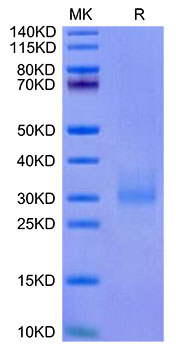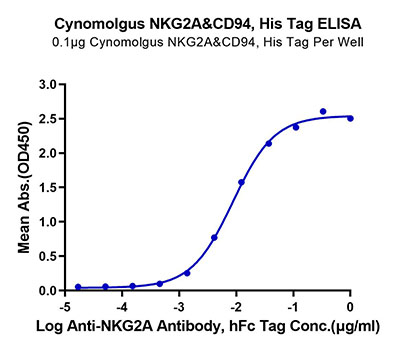Description
Recombinant Cynomolgus NKG2A&KLRD1/CD159a&CD94 Protein
The Recombinant Cynomolgus NKG2A&KLRD1/CD159a&CD94 Protein is a high-quality recombinant protein produced for advanced research applications in molecular biology and biotechnology. This protein serves as a critical reagent in various experimental contexts, including functional studies, binding assays, and therapeutic development programs, providing researchers with a standardized and reliable tool for investigating protein function and interactions.
This product (SKU: RPCB1739) is produced using HEK293 cells and features a C-His&Flag tag for convenient detection and purification. The protein exhibits a calculated molecular weight of 17.01 kDa(NkG2A), 18.27 kDa(CD94) with an observed molecular weight of 25-35 kDa under denaturing conditions, achieving ≥ 95 % as determined by Tris-Bis PAGE., ensuring exceptional quality and consistency for research applications.
Key Features
| High Purity by Affinity Chromatography | |
| Mammalian & Bacterial Expression Systems | |
| High lot-to-lot consistency via strict QC |
| Product Name: | Recombinant Cynomolgus NKG2A&KLRD1/CD159a&CD94 Protein |
| SKU: | RPCB1739 |
| Size: | 100 μg |
| Reactivity: | Cynomolgus |
| Synonyms: | CD159a, NKG2A, NKG2-A, CD94, NKG2A&CD94 |
| Tag: | C-His&Flag |
| Expression Host: | HEK293 cells |
| Calculated MW: | 17.01 kDa(NkG2A), 18.27 kDa(CD94) |
| Observed MW: | 25-35 kDa |
| Protein Description: | High quality, high purity and low endotoxin recombinant Recombinant Cynomolgus NKG2A&KLRD1/CD159a&CD94 Protein (RPCB1739), tested reactivity in HEK293 cells and has been validated in SDS-PAGE.100% guaranteed. |
| Endotoxin: | < 1 EU/μg of the protein by LAL method. |
| Purity: | ≥ 95 % as determined by Tris-Bis PAGE. |
| Reconstitution: | Centrifuge the tube before opening. Reconstitute to a concentration of 0.1-0.5 mg/mL in sterile distilled water. Avoid vortex or vigorously pipetting the protein. For long term storage, it is recommended to add a carrier protein or stablizer (e.g. 0.1% BSA, 5% HSA, 10% FBS or 5% Trehalose), and aliquot the reconstituted protein solution to minimize free-thaw cycles. |
| Storage: | Store at -20℃.Store the lyophilized protein at -20℃ to -80 ℃ up to 1 year from the date of receipt. After reconstitution, the protein solution is stable at -20℃ for 3 months, at 2-8℃ for up to 1 week. |
The ligand-receptor assignment between HLA-G and NKG2A/CD94 is dependent of the amino acid composition in the HLA-G heavy chain. Understanding the biophysical basis of receptor-mediated events that lead to NK cell inhibition would help to remove non-tumor reactive cells and support personalized mild autologous NK cell therapies.








